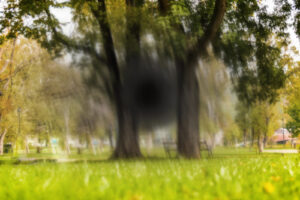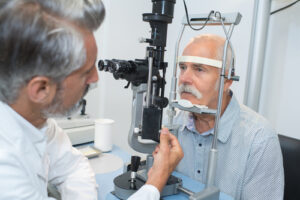One of the most important things you can do for your eye health is to educate yourself about different eye conditions so that you can recognize the symptoms right away and get prompt treatment as needed. One very common eye condition that typically develops due to age is macular degeneration.
Keep reading to learn more about macular degeneration and how you can recognize the signs and symptoms!
What Is Macular Degeneration?
Macular degeneration is an age-related eye condition that affects the retina at the back of the eye. Over time, it can cause decreased central vision, among other visual symptoms.
There are two types of macular degeneration: wet macular degeneration and dry macular degeneration. Dry macular degeneration is the most common type of age-related macular degeneration.

It is characterized by the gradual loss of cells in the macula, the small area at the center of the retina that is responsible for central vision. While dry macular degeneration does not usually progress as rapidly as the wet form of the eye condition, it can still lead to significant vision loss over time.
Wet macular degeneration is characterized by the growth of new, abnormal blood vessels in the retina, which can leak fluid and blood, leading to further damage to the macula. This type can occur in people who have already been diagnosed with the dry form, or it can occur on its own.
Wet macular degeneration can lead to more rapid vision loss than dry macular degeneration, so early detection and treatment are vital.
What Are the Symptoms of Macular Degeneration?
Macular degeneration requires timely treatment to prevent further vision loss. For this reason, it is important to make note of some of the most common signs and symptoms of the eye condition. That way, if you happen to experience them, you can get to your eye doctor for treatment right away.
The most common symptom of macular degeneration is blurry or distorted vision that may make it difficult to read, recognize faces or see fine details. Those with macular degeneration may also have difficulty seeing objects in low-light or distinguishing colors.
Another common symptom of macular degeneration is straight lines appearing wavy or dark or empty areas in the center of your vision. If you are experiencing any of these symptoms, you should see your eye doctor as soon as possible!
How Do Eye Doctors Detect Macular Degeneration?
Looking for changes in your eyes that may indicate possible eye conditions, including macular degeneration, is something that your eye doctor does during every comprehensive eye exam. For this reason, annual eye exams are essential for the early detection and treatment of macular degeneration, among other eye conditions.
In order to detect any changes that may be present in your retina, your eye doctor will need to perform a dilated exam. Dilation is typically a part of a routine part of an eye exam.
To dilate your eyes, your eye doctor will place drops into your eyes that will cause your pupil to enlarge. Then, they will use a special microscope called a slit lamp to view the intricate structures of your eye, including the retina.

Without dilation, your pupil would shrink in response to the light, and your eye doctor would have no way to look at some of the most important parts of your eye. Beyond examining your eyes, your eye doctor will also check your vision.
Early detection is crucial when it comes to macular degeneration, so our doctors at Blaine Eye Clinic offer the option of a screening wellness scan that can be added to your visit. The wellness scan is not part of your routine exam coverage but can be added with a small additional copay.
It takes a retinal scan and photo of the back of your eye that can detect changes related to macular degeneration as well as glaucoma before they can be seen with a dilated eye exam. Rest assured that with or without a wellness scan, your doctor is taking all measures possible to monitor for any change.
If your eye doctor at Blaine Eye Clinic notices any signs that you may have macular degeneration during the examination, they may conduct further medical testing, such as taking a more in depth scan of your retina to get a more detailed view. If your eye doctor believes you may have macular degeneration, they will refer you to a retinal specialist for treatment.
Who is Most At-Risk for Developing Macular Degeneration?
Anyone can develop macular degeneration in older age. However, some factors may cause you to be more likely to develop it.
Macular degeneration is a very common eye condition and is the leading cause of vision loss in people over the age of sixty. The risk of developing macular degeneration increases with age and is more common in people over the age of fifty.
It is also more common for women to develop it than men. Other factors that may increase the risk of developing macular degeneration include a family history of macular degeneration, a history of smoking, and exposure to UV radiation.
People with diabetes, high blood pressure, or high cholesterol may also be at increased risk for developing the condition. Since anyone can develop macular degeneration, if you are over the age of fifty, it is important that you visit your eye doctor regularly to ensure that your eyes are healthy and that you are not at risk for vision loss.
Can Macular Degeneration Be Cured?

Now that you know the basics of macular degeneration, you may wonder if there is a cure for this eye condition. Unfortunately, eye care professionals and researchers are still working on a cure for macular degeneration.
However, there are a number of treatments that can slow the progression of macular degeneration and help preserve vision. These treatments include medications and procedures that are designed to stop the growth of new blood vessels in wet macular degeneration and supplements that may help slow the progression of dry macular degeneration.
In some cases, low vision aids such as magnifiers or special glasses can help people with reduced vision due to macular degeneration to better see objects and read. The best way to prevent vision loss due to macular degeneration is early detection and consistent treatment.
If you are diagnosed with macular degeneration, your optometrist and retinal specialist will work with you to develop a treatment plan to help avoid any further vision loss.
How to Best Protect Your Eyes
The best way to protect your eyes is to visit your eye doctor at Blaine Eye Clinic for routine exams. Through regular routine exams, your eye doctor will be able to detect any signs of macular degeneration early.
If your eye doctor determines that you have macular degeneration, they will refer you to a retinal specialist for treatment. If you notice any symptoms of macular degeneration or a sudden decrease in your vision, schedule an appointment with your eye doctor immediately.
Are you experiencing symptoms of macular degeneration or want to learn more about the eye condition? Schedule an appointment at Blaine Eye Clinic in Blaine, MN, today!





